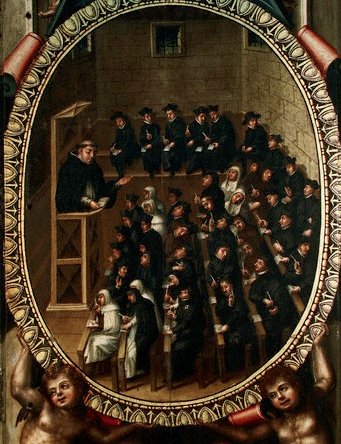As Acton’s librarian I can’t help but be immersed in the history of the Institute. I regularly stumble upon thought-provoking material from well before I began my work here in the late 2000’s which is itself a continuing education.
One document in particular that I always return to is Father Robert Sirico’s 1998 contribution to the the Journal of Markets and Morality, ‘The Late-Scholastic and Austrian Link to Modern Catholic Economic Thought.’ It is an excellent introduction the main counters of economic thought within Catholic social teaching from the Late-Scholastics to Pope Saint John Paul II:
The reliance of the modern Catholic view of economics on Late-Scholastic thought has been more pronounced than ever. Both place enterprise, human initiative, the price system, exchange, private property, the division of labor, and the liberty of contract at the center of economic life. Unlike more positivist schools of economic thought, the modern Catholic approach never loses sight of the centrality of the acting person; the subjective will, and all that this implies, is the driving force behind economic life. That appreciation of the acting person is combined with a skepticism toward unnecessary uses of governmental power.
This bears a striking resemblance to many of the key themes of Austrian School:
The Austrian School is, from all appearances, a purely secular one, but one that arrived at Scholastic conclusions about the nature of economic value and the inherent workability of free exchange in markets. Carl Menger’s work secured a foundation for a body of thought in the Austrian School that developed in this century around the works of Ludwig von Mises and F. A. Hayek. As with the Late Scholastics, the focus of the Austrian School is on individual intentions and purposes, and the schools share a high regard for enterprise and a dim view of the uses of power against the natural activity of economic exchange. In this sense, the Austrian economists, unknowingly, have furthered aspects of the personalist agenda.
Father Robert explores the historical connection between these seemingly disparate schools which share so much in both their focus and methods. Please do read the whole thing which, like all but the two most recent issues of the Journal, are freely available for your research and reading pleasure at the Journal’s website. You may also subscribe to the Journal of Markets and Morality to get access to the latest two as well as future issues here.
